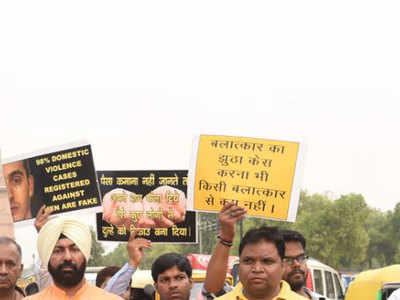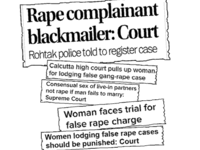- News
- India News
- #MenToo: Cops at a loss when live-in status, rape law intersect
Trending
This story is from May 14, 2019
#MenToo: Cops at a loss when live-in status, rape law intersect

Top Picks For You

#MenToo: Law used for vendetta in many break-ups, say HCs

#MenToo movement: Is it time for debate on anonymity of rape accused like in Ireland, ask activists, lawyer

#MenToo: The great Indian gender pushback, now from men

#MenToo: Karan Oberoi sent to 14-day judicial custody, family happy ‘it’s a step closer to bail’

Karan Oberoi files for bail, submits texts as proof of consent

Filmmaker Deepika Narayan Bhardwaj: #MenToo is as important as #MeToo
Legal expert C A Sundaram, speaking to TOI from Ooty on Monday, said, “The police must look at these cases as cases of breach of promise and distinguish between heinous rape and ones like these.” For the police, the problem is that women in such cases often allege the use of “force”, leaving them no option but to register them as the cognisable and serious offence of rape.
Justice (Retd) V M Kanade of the Bombay high court said, “The Supreme Court has recognised live-in relationships. The law protects women in such relationships from domestic violence. Live-in is a concept we took from the western world and is no longer as taboo as it used to be, say, five decades ago. This shows that the law needs to make a departure from the general rule governing rape cases and carve out an exception for certain cases.”
Sundaram and other activists, including pro-
gender equality campaigner Deepika Bhardwaj and Mumbai-based writer Anand Sivakumaran, assert that a distinction needs to be made between two kinds of cases: the heinous kind, like of Nirbhaya, or where a woman is overpowered, and the kind that comes with the outline of a relationship, live-in or otherwise. “Unfortunately, the definition of rape has seen an expansion to include complaints which are essentially to be viewed as breach of promise, a civil case, a case of tort,” Sundaram said.
Echoing the views of a former high court judge, he said, “Depending on the facts of the case, the police should be required to first conduct initial inquiries and verify before invoking rape as an offence. Otherwise, it is nothing but vengeance by the woman and harassment by the police. Allowing a law to be converted into an instrument of oppression is against the very rule of law.”
The question is: aren’t women, by screaming rape when there is eventually none, not diminishing the very heinousness of the crime and thus hurting the interests of women? “Yes,” was the resounding response of former judges, legal eagles and activists alike. “It is like crying wolf,” said Sundaram. “Not to mention making a mockery of real victims of rape,” said Sivakumaran and Bhardwaj.
End of Article
FOLLOW US ON SOCIAL MEDIA










